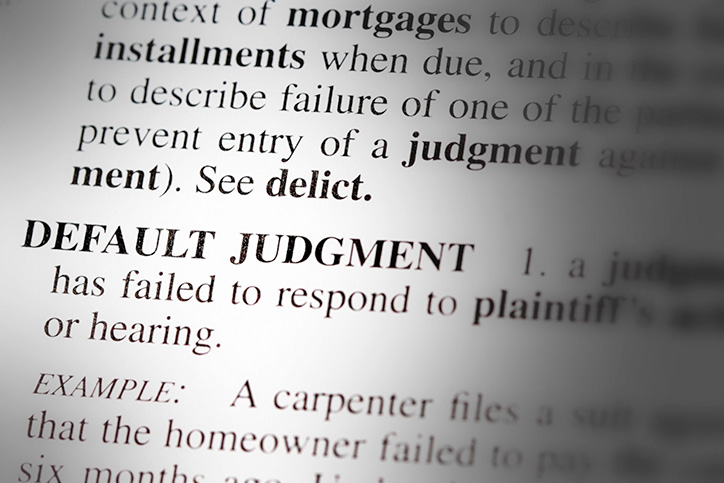You Failed to Appear in Court After Being Served with a Lawsuit – Now What?
If you are served with a writ of summons or other documents related to a lawsuit in which you are named as a party to the lawsuit, it is very important that you file a responsive paper with the court within the time period established by law for doing so. Do not delay, or ignore this type of legal paper. Prompt consultation with an attorney is strongly advised. The deadline for filing a responsive paper with the court after receiving delivery of a writ of summons or other court papers depends on the situation, but any such deadline will probably be stated on the face of the writ of summons document.
If you do not file a responsive paper with the court prior to the deadline for doing so, the court can enter an “Order of Default” and/or a “Judgment of Default.” The District Court of Maryland, the Circuit Courts in Maryland, and the U.S. District Court for the District of Maryland, all have different filing deadlines and differing rules and standards for what happens when a defendant fails to make a timely appearance in a lawsuit. This article briefly and generally summarizes this topic, but the rules are complicated and the potential harm from non-compliance can be substantial, so you should promptly contact an attorney for representation and assistance.
District Court of Maryland
The Maryland Rules of Civil Procedure provide that a defendant named in a District Court of Maryland lawsuit must file a Notice of Intention to Defend within a specified time period after being served. If a defendant fails to file a Notice of Intention to Defend, then the court may assess liability against the defendant on the scheduled trial date. If a defendant fails to file a Notice of Intention to Defend, the court may enter judgment against the defendant for the full amount of damages claimed in the Complaint if the court is satisfied with the information stated in the complaint and the complaint is property signed as an affidavit under oath by the plaintiff. Sometimes the District Court will find that a complaint sets forth sufficient information for the entry of judgment against the defendant as far as liability is concerned, but will hold an evidentiary hearing only as to the question of the amount of monetary damages to be awarded. Defendants should file a Notice of Intention to Defend within the time period set forth in the writ of summons for doing so. Even if that deadline is missed, a defendant should still file a Notice of Intention to Defend prior to the scheduled trial date, or at the latest should appear on the scheduled trial date and submit a Notice of Intention to Defend to the court at that time.
Maryland Circuit Courts
In the Maryland Circuit Courts, a defendant that fails to file an Answer or other responsive pleading within the specified time for doing so may have an Order of Default against the defendant. An Order of Default may thereafter be vacated by the court if the defendant appears before the court within a set time period and states good cause for why the filing deadline was missed. If the Order of Default is not vacated, the court thereafter may enter a Judgment of Default against the defendant in the full amount claimed by the plaintiff in the complaint.
In the District Court of Maryland and in Maryland Circuit Courts there are specific deadlines that must be adhered to in order to preserve a litigant’s right to present a defense and avoid entry of judgment by default. If you find yourself in this situation, contact an attorney to advise you on the best course of action.
None of the information provided in this article constitutes legal advice. Every situation is different and should be thoroughly reviewed by and discussed with your legal advisors. The above general summary is not a comprehensive discussion of the subject matter, nor is it applicable to states or jurisdictions outside of the State of Maryland. Please do not rely on the contents of this article as a basis for making decisions regarding your particular situation.

Lisa White
Latest Posts
Expert Witnesses in Litigation
When pursuing a civil lawsuit, there may be times when it is critical to have an expert witness testify on your behalf. An expert witness is someone with...
Big Changes to Maryland’s Landlord – Tenant Law
Effective October 1, 2025, Maryland’s landlord-tenant laws have undergone significant changes that are intended to address long‐standing concerns about how...
